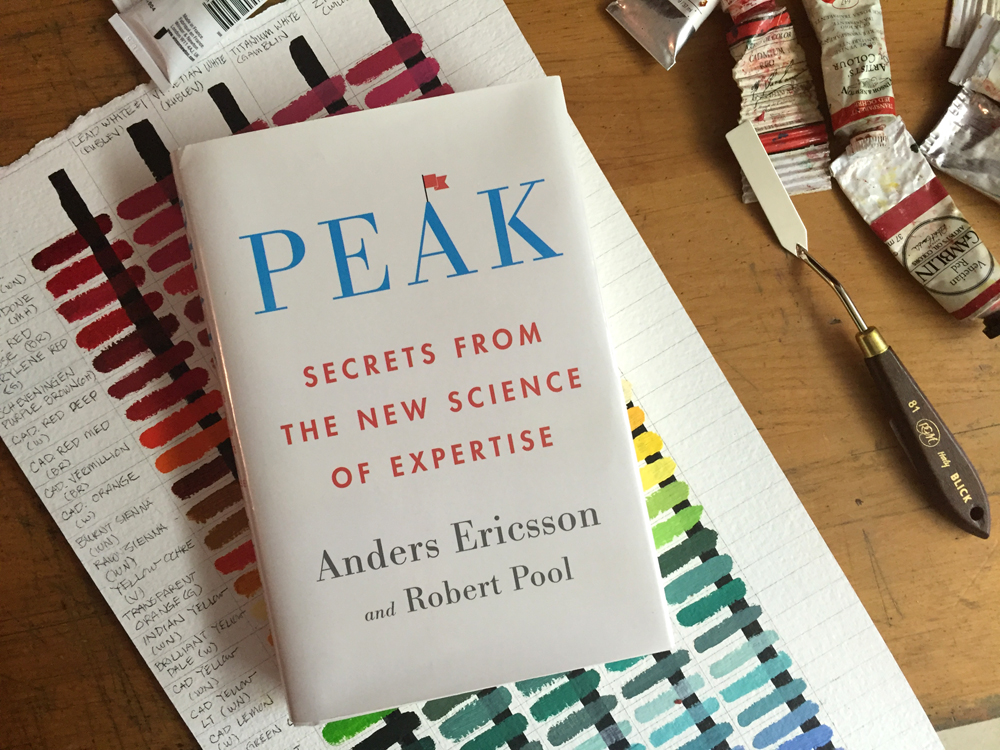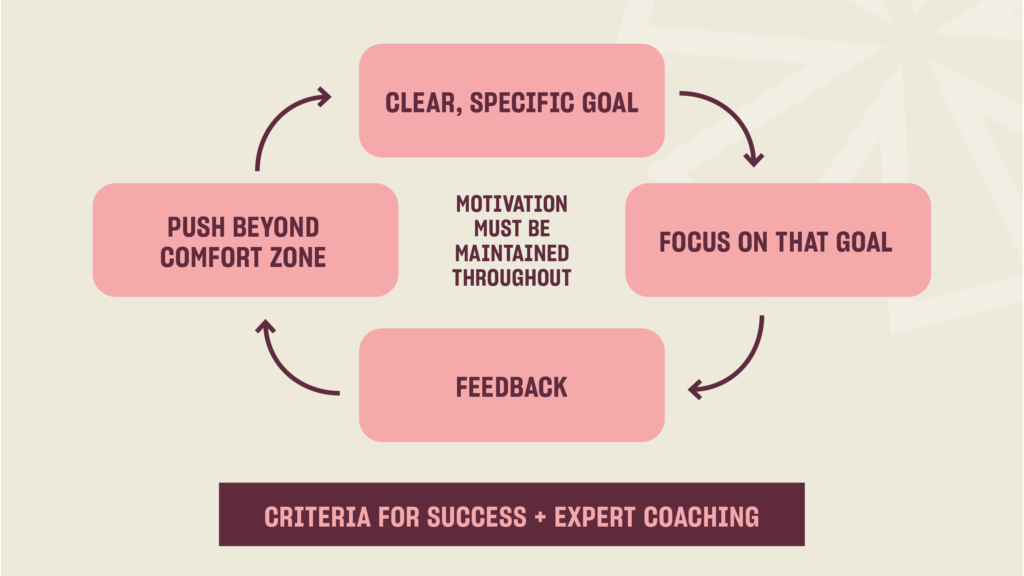
Peak:
Secrets From the New Science of Expertise
On this page:
- ⭐ Key Notes
- 🤸🏻♂️ Chapter 1: the power of pusposeful practice
- 🦎 Chapter 2: harnessing adaptability
- 🧠 Chapter 3: mental representations
- 🥇 Chapter 4: the gold standard
- 💼 Chapter 5: principles of deliberate practice on the job
- 🏡 Chapter 6: principles of deliberate practice in everyday life
- 🛣 Chapter 7: the road to extraordinary
- 👶🏻 Chapter 8: but what about natural talent?
- 🧭 Chapter 9: where do we go from here?
- 📹 Video Summary
⭐ Key Notes
🤸🏻♂️ Chapter 1: the power of pusposeful practice
Naive practice
- Once we reach a satisfactory level of skill and automate performance, we stop improving.
- Additional years of acceptable performance and automaticity do not lead to improvement.
- Automated abilities deteriorate in the absence of deliberate efforts.
Deliberate practice
- Well-defined with specific goals
- Many baby steps to reach a long-term goal
- Focused
- Full atention
- Feedback
- Without feedback, you do not know what or how to improve.
- Meaningful positive feedback is crucial to maintaining motivation.
- Internal feedback – seeing yourself improve.
- External feedback – provided by others.
- Push beyond comfort zone.
- Try something you could not do before.
- Often, the goal is not to try harder, it is to try something different.
- Approach from a different direction
- Work with a teacher or coach.
- Someone familiar with the obstacles can suggest ways to overcome them.
Get outside your comfort zone, but do it in a focused way, with clear goals, a plan for reaching those goals, and a way to monitor your progress. Finally, figure out a way to maintain your motivation.

🦎 Chapter 2: harnessing adaptability
- The structure and function of the brain can change in response to mental training – similar to muscle and cardio training.
- The hippocampus is involved in the development of memory.
- Continually push to keep the body’s compensatory changes coming.
- Pushing too far beyond comfort zone can risk injury and setback.
- Learning a new skill is more effective at triggering structural changes in the brain, than continuing to practice an already learned skill.
Brain training
- Regular training leads to changes in the parts of the brain being challenged.
- The brain adapts by rewiring in ways that increase its ability to carry out the function.
- Effect of brain training can vary with age.
- Younger brains are more adaptable, so training can have a greater impact.
Bent-twig effect
- If you push a small twig slightly away from its normal pattern of growth, you can cause a major change in the ultimate location of the branch that grows from that twig.
- Pushing on a branch that is already developed has much less effect.
Cognitive maintenance
- Developing a skill or ability to an extraordinary degree tends to regress another area.
- Cognitive and physical changes caused by training require upkeep.
- Many people do not possess extraordinary capabilities because they are satisfied to live in comfort, not because they do not have the capacity.
- Most live in the world of good enough.
Comfort zone
- Traditional learning approached do not challenge homeostasis.
- The traditional view is that your potential is fixed and learning simply aims to fulfil an innate potential.
- Challenging homeostatis can force the brain and body to adapt.
- Potential can be increased through deliberate practice outside the comfort zone.
🧠 Chapter 3: mental representations
The amount of time spent analysing positions – not the amount of time spent playing chess with others – is the single most important predictor of a chess player’s ability. It generally takes about ten years of this sort of practice to reach the level of grandmaster.
- Mental representation – a mental structure that corresponds to an object, an idea, or a collection of information, that the brain is thinking about.
- Deliberate practice involves developing mental representations.
- Mental representation make it possible to process large amounts of information quickly, despite the limitations of short-term memory.
- The quality and quantity of mental representations distinguishes experts from others.
- Through years of practice, experts develop highly complex mental represenations, allowing faster and more accurate decisions.
- Neural circuitry can change with years of deliberate practice.
Developing mental representations
- The more you study, the more detailed your mental representations.
- Better mental representations make you better at assimilating new information.
- To write well – develop a mental representation ahead of time and guide your efforts.
- Modify the representation over time.
🥇 Chapter 4: the gold standard
- Nobody develops extraordinary abilities without putting in tremendous amounts of practice.
- Deliberate practice requires a teacher who can provide activities designed to improve performance.
- The performers’ accomplishments guide deliberae practice.
- Understanding of what experts do to excel drives purpose, by knowing where to go and how to get there.
- It is important to understand what distinguishes expert performers from the rest in the field.
Traits of deliberate practice
- Others have already figured out how to develop the skill and effective training techniques have been established.
- Practice should be designed and overseen by a teacher or coach, who is familiar with the abilities of expert performers.
- Venture outside comfort zone to try things beyound your current abilities.
- Demands near-maximal effort.
- Often not enjoyable.
- Well-defined and specific goals have been established.
- Develop a plan for making a series of small changes that accumulate to a bigger goal.
- Measurable performance allows a performer to see progress.
- Requires full attention and focus.
- Concentrate on the specific goal and make adjustments to control practice.
- Feedback and modification to efforts in response to that feedback.
- Initial feedback will come from the coach.
- With time and experience, students must learn to monitor themselves, identify mistakes, and adjust.
- Produces and depends on effective mental representations.
- With practice, mental representations become more detailed effective.
- More effective representations allow the student to improve even more.
- Involves building or modifying previously acquired skills.
- Skills are built on top of existing skills.
- It is important to provide beginners with the correct fundamental skills.
Seeking experts
- Be careful when identifying expert performers.
- In many fields, the experts do not reliably perform better than others.
- Determine an objective measure of performance to compare abilities (or as close as possible).
- Ask professionals – who they would seek for help with a particularly difficult situation.
💼 Chapter 5: principles of deliberate practice on the job
Reject three prevailing myths
- The belief that one’s abilities are limited by genetically prescribed characteristics.
- If you do something for long enough, you will become better at it.
- All it takes to improve is effort – if you try hard enough, you will get better.
Deliberate practice mindset
- Anyone can improve.
- Improvement requires the right approach – the right way of practicing.
- Business professionals tend to focus on knowledge at the expense of skills.
- Tradition and convenience makes it easier to present knowledge to a large group of people, rather than setup conditions for skill deevlopment through deliberate practice.
🏡 Chapter 6: principles of deliberate practice in everyday life
- Keep moving forward.
- Change teachers as you grow or plateau.
- Shorter training sessions with clearer goals arethe best way to develop new skills faster – focus and concentrate.
- Practice effectively without a teacher – Focus, Feedback, Fix it.
- Decompose the skill – break down into components that can be done repeatedly and analysed effectively.
- Determine weaknesses and how to address them.
Break the plateau
- The best way to move beyond a plateau is to challenge your brain and body in a new way.
- Complex skills require a variety of components.
- At the point of greatest difficulty, it may only be a few components of the skill holding you back – not all of them.
- To figure out the blocking components – push yourself a little harder than usual and see observe where you fail.
- Design a practice technique aimed at improving a particular weakness.
Maintain consistency
Anyone who hopes to improve a skill should devote an hour or more each day, to practice that can be done with full concentration.
- Maintain motivation – strengthen reasons to keep going, or weaken the reasons to quit.
- Good planning – avoid the pitfalls that may lead to less time on practice.
- Eliminate interference – minimise the influence of anything that might interfere with your training.
🛣 Chapter 7: the road to extraordinary
- Chikdren are introducd to their field of interest in a palyful way.
- Parents of experts play a crucial role in development.
- Parents give their children a great deal of time, attention, and encouragement.
- Parents tend to be achievement-oriented and teach their children values such as self-discipline, hard work, responsibility, and spending time constructively.
Praise
- Praise provides motivation to reinforce behaviours.
- The satisfaction of having developed a skill – especially if achieevement is acknowledged by parents.
- A child who sees an older siblibg perform well and receive praise, will naturally want to join and garner attention.
- Sibling competition can be motivating in itself.
Teachers and coaches
- Once a student becomes interested and shows interest in an area – take lessons.
- Helping children to develop mental representations can increase motivation by appreciating the skill.
Commitment
- In the early teens, students must make a commitment to be the best they can be.
- Motivation lies solely with the student, although family may play a support role.
Beyond existing knowledge
- Make unique contributions to area of expertise.
- Researchers who study creative geniuses come up with their own innovations.
- This is a long, slow, and itterative process.
- Creativity goes hand in hand with the ability to work hard an maintain focus for long periods of time.
👶🏻 Chapter 8: but what about natural talent?
- There is no convincing evidence that extraordinary abilities develop without intense and extended practice.
- All abilities can be explained with two questions:
- What is the exact nature of the ability?
- What sorts of training is made possible?
- People stop learning and improving because they stop practicing, not because of innate limits.
- In the long-run, those who practice will prevail.
🧭 Chapter 9: where do we go from here?
- When teaching a skill – break the lesson into a series of steps that students can master one at a time.
- Build towards the ultimate objective in small steps.
- Begin by identifying what students should learn how to do – skills, not knowledge.
- Examine how the experts learn and practice.
- Understand as much as possible about the mental representations used by experts.
- Keep students slightly outside their comfort zone.
- Offer plenty of repetition and feedback.
